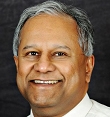It was a provincial election that no one in Ontario seemed to want. While many voters were reluctant to take part, others saw it as an unpleasant task given the fatigue with politics that has been growing over the years. “I wish I was voting for and not against something,” said a new Canadian first-time voter who did not want to be named. He was alluding to the negative campaigns of the three main political parties in the fray. “With the stench of scandals hanging in the air, we need to hold our noses and vote for the best among the lot.”
On Thursday, June 12, Ontarians appear to have just done that: collectively held their noses and voted with eyes wide open to avert waking up to what otherwise would have been an ominous new beginning on Friday the 13th, a day steeped in superstition.
On display was the wisdom of the crowd that defied predictions of a poor turnout and ignored advice by the Globe’s editorial board to “choose the Progressive Conservative Party – but kept on the short leash of a minority government.”
The paper’s editors were apparently not alone in their inability to decide between poor choices. The electorate, in turn, did something almost Darwinian. They instinctively selected Canada’s “natural governing party,” the Liberals, for yet another term in office. And they voted in larger numbers than the last time round. Unofficial results say turnout was 51.7 per cent. That is 3.5 percentage points higher than the 2011 elections which saw the lowest voter turnout Ontario has ever seen at 48.2 per cent. If the official numbers that come out on June 18 bear this out, it would halt a years-long trend that has seen the past three general elections each bring fewer voters to the polls than ever before.
A second chance
“The voters have given Premier Kathleen Wynne a second chance. The Liberals would now have no excuse to renege on the promises they made during the campaign,” says Suresh Naik, the Guelph resident whose pointed question on trust set the tone for the only leaders’ debate in the run-up to the election. “Creating more private sector jobs should be a top priority, as it would benefit all Ontarians, including new Canadians.”
“Creating more private sector jobs should be a top priority, as it would benefit all Ontarians, including new Canadians.”
Wynne sounded genuinely grateful for that second chance. “We will not let you down,” she said, thanking the people of the province repeatedly in her victory speech. “We will not take you for granted.”
During the campaign, at an ethnic media briefing, she said her top priority if re-elected would be to reintroduce the left-leaning populist budget which failed to get opposition support last month and triggered the election. This was before the leaders’ debate and Wynne was at her campaign best, rattling of figures like an earnest school principal proud of her institution’s achievements and at the same time not too eager to chastise the laggards.
Her energy was palpable. When asked about the one thing that keeps her awake at night, she said she tries to tackle many hot-button issues during the course of a day that starts as early as 3.30 a.m. Pressed further on a priority issue, she said it would be to ensure the manufacturing sector’s transition into more advanced areas to create good, high-paying jobs. “That’s one of the issues that keeps me awake at times.”
The Liberals’ 10-year, $2.5 billion Jobs and Prosperity Fund will build partnerships with industries across Ontario to secure investments that create jobs, increase productivity and help businesses compete globally, she said.
First-ever immigration legislation
One can also expect efforts to revive bills that have ‘died on the Order Paper’ (i.e., did not become law) as a result of the election call, including the Ontario Immigration Act “to ensure we attract skilled immigrants to fill labour market needs.” Bill 161, the province’s first ever immigration legislation follows A New Direction: Ontario’s Immigration Strategy, released in November 2012.
It includes parts that would allow Ontario to:
- Select an agreed number of immigrants in collaboration with the federal government
- Establish a registry of employers eligible to make job offers to selected immigrants
- Enact compliance and enforcement measures to protect people from fraudulent immigration services and to deter fraud in the immigration application process
- Increase fairness in the job market for internationally trained health professionals
As Progressive Conservative Party leader Tim Hudak said in his speech accepting electoral defeat, Wynne should be well aware that the majority vote for her party is not an endorsement of the status quo. It is, as she herself framed it, a “referendum on the future of Ontario’s economy.” It was also a vote against the risky indecision of New Democratic Party (NDP) leader Andrea Horwath and Hudak’s promise to fire public sector workers that would have played havoc with the economy.
Now that she has got a clear mandate of her own and unburdened of the baggage inherited from her predecessor, former premier Dalton McGuinty, Wynne has a clean slate to draw her plan for the “One Ontario” that forms the core of her value system. Having run a good election campaign, she now has to deliver on the promises. And having proved themselves to be smart, Ontarians will understand what former New York Governor Mario Cuomo once said: “You campaign in poetry. You govern in prose.”
Ranjit is a Toronto-based writer with interest in Canadian civic affairs, immigration, the environment and motoring. Maytree and Al Jazzera English alumnus.





